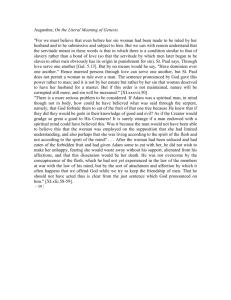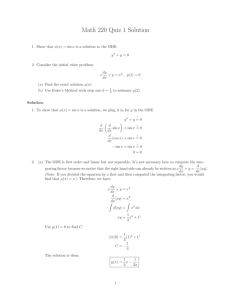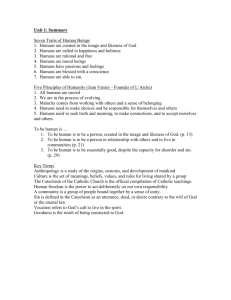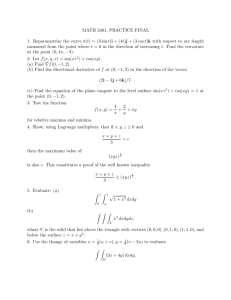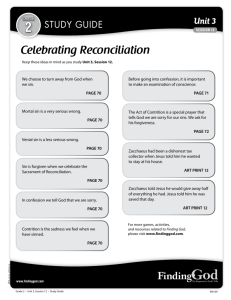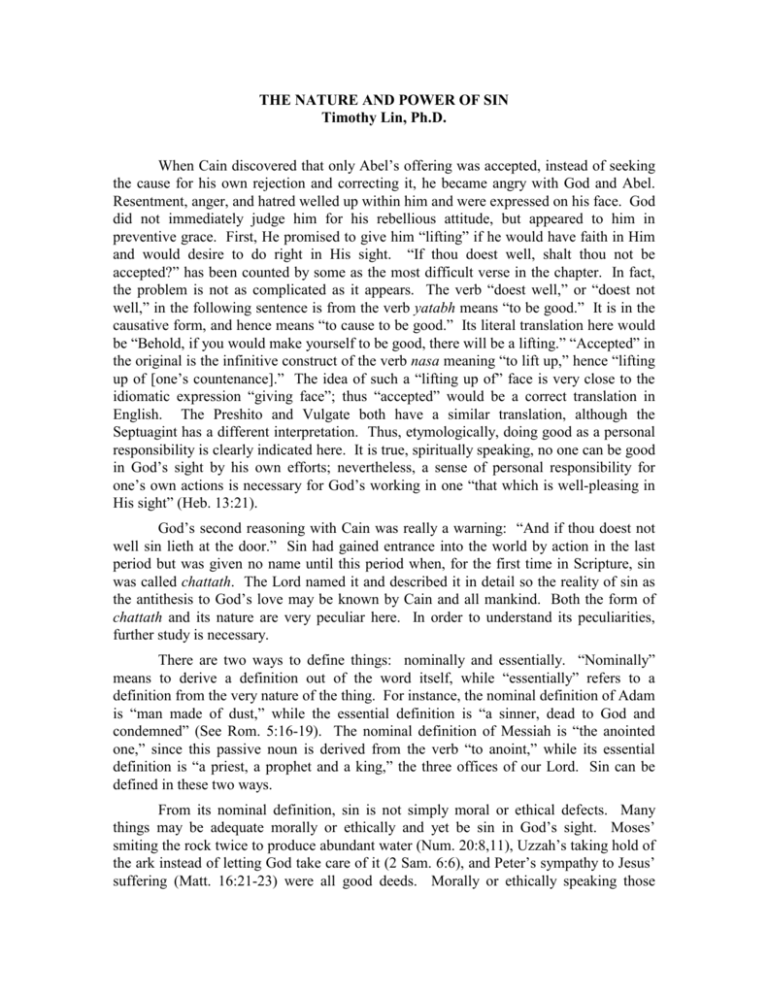
THE NATURE AND POWER OF SIN
Timothy Lin, Ph.D.
When Cain discovered that only Abel’s offering was accepted, instead of seeking
the cause for his own rejection and correcting it, he became angry with God and Abel.
Resentment, anger, and hatred welled up within him and were expressed on his face. God
did not immediately judge him for his rebellious attitude, but appeared to him in
preventive grace. First, He promised to give him “lifting” if he would have faith in Him
and would desire to do right in His sight. “If thou doest well, shalt thou not be
accepted?” has been counted by some as the most difficult verse in the chapter. In fact,
the problem is not as complicated as it appears. The verb “doest well,” or “doest not
well,” in the following sentence is from the verb yatabh means “to be good.” It is in the
causative form, and hence means “to cause to be good.” Its literal translation here would
be “Behold, if you would make yourself to be good, there will be a lifting.” “Accepted” in
the original is the infinitive construct of the verb nasa meaning “to lift up,” hence “lifting
up of [one’s countenance].” The idea of such a “lifting up of” face is very close to the
idiomatic expression “giving face”; thus “accepted” would be a correct translation in
English. The Preshito and Vulgate both have a similar translation, although the
Septuagint has a different interpretation. Thus, etymologically, doing good as a personal
responsibility is clearly indicated here. It is true, spiritually speaking, no one can be good
in God’s sight by his own efforts; nevertheless, a sense of personal responsibility for
one’s own actions is necessary for God’s working in one “that which is well-pleasing in
His sight” (Heb. 13:21).
God’s second reasoning with Cain was really a warning: “And if thou doest not
well sin lieth at the door.” Sin had gained entrance into the world by action in the last
period but was given no name until this period when, for the first time in Scripture, sin
was called chattath. The Lord named it and described it in detail so the reality of sin as
the antithesis to God’s love may be known by Cain and all mankind. Both the form of
chattath and its nature are very peculiar here. In order to understand its peculiarities,
further study is necessary.
There are two ways to define things: nominally and essentially. “Nominally”
means to derive a definition out of the word itself, while “essentially” refers to a
definition from the very nature of the thing. For instance, the nominal definition of Adam
is “man made of dust,” while the essential definition is “a sinner, dead to God and
condemned” (See Rom. 5:16-19). The nominal definition of Messiah is “the anointed
one,” since this passive noun is derived from the verb “to anoint,” while its essential
definition is “a priest, a prophet and a king,” the three offices of our Lord. Sin can be
defined in these two ways.
From its nominal definition, sin is not simply moral or ethical defects. Many
things may be adequate morally or ethically and yet be sin in God’s sight. Moses’
smiting the rock twice to produce abundant water (Num. 20:8,11), Uzzah’s taking hold of
the ark instead of letting God take care of it (2 Sam. 6:6), and Peter’s sympathy to Jesus’
suffering (Matt. 16:21-23) were all good deeds. Morally or ethically speaking those
incidents were not blameworthy, yet they were all counted as sin in God’s sight. The
word chattath (sin) is derived from the verb chata, “to miss the mark,” and is used in
Judges 20:16 to describe those slingers who did not “miss their mark.” Thus the nominal
definition of sin is missing the mark set by God, which is lack of conformity to God’s
will. God has ordained definite means and end for every action and has set the right time
and way of doing everything. If anything or any action is not carried out according to
God’s means, end, time, and method, no matter how moral and ethical it may be, it is sin.
For its essential definition, the nature of sin can be seen from its morphology and
syntax. First, sin is attractive. The form of the word itself is in the feminine gender,
denoting the attractiveness of sin in its seductive appeal, while its actual gender is
masculine as indicated by the following modifying masculine participle robhets,
crouching, denoting the destructive power and tyrannous nature of sin. Thus sin is double
gendered. It would never approach a person with its ugly face but always with sweet
appearance, sympathetic talking, and affectionate touching. When sin has caught the
victim, however, it binds him with its cords (See Prov. 5:22) and slays him (See Rom.
7:11). Second, sin is intensive and forcible. Besides its actual masculine gender, the
extreme strength of sin is also shown by the intensive form of the noun chattath,
indicated by the doubling of its second radical, tt. It can even rob some people of sleep
until they do wrong (See Prov. 4:16), or cause others to be like the troubled sea without
ever having rest (See Is. 57:20). Third, sin is aggressive. The ever militant activity of sin
is expressed by the nature of the Hebrew active participle which expresses active and
continuous action in the past, present, and future to describe its ceaseless crouching or
lying in wait, as a lion being ever ready to spring upon anyone going out the door. Keil
and Delitzsch described it well. “The feminine chattath is construed as a masculine . . .
sin is personified as a wild beast, lurking at the door of the human heart, and eagerly
desiring to devour his soul.”1 This personification of sin as an unrestrained animal might
have laid the foundation for the revelation much later of Satan as a roaring lion walking
about seeking whom he might devour (See 1 Pet. 5:8).
God made it plain to Cain that he had no reason to be angry with Him and Abel,
and that he had to realize the power of sin and its consequence upon himself. In later
revelation, chattath would come to mean both sin and sin offering. In the Authorized
Version it is translated as sin 169 times, sin offering 116 times, punishment and
purification for sin twice each, and punishment of sin and purifying once each. It is a
remarkable message that where there is sin, there is the punishment of sin and yet there is
also a sin offering. Surely this is the embryonic form of the distant revelation “But where
sin abounded, grace did much more abound” (Rom. 5:20). Thus God brought to Cain’s
attention that although sin and punishment were crouching at the entrance, the sin
offering and purification for sin were also there. However, Cain himself had to make the
final decision between life and death, blessing and curse, since he alone was responsible
for mastering the ever-present sin (4:7). Unfortunately, Cain chose the latter, rejecting
God’s reasoning, and as a result committed the first murder on the earth.
1
C. F. Keil and F. Delitzsch, Biblical Commentary on the Old Testament (Grand Rapids: Wm. B. Eerdmans
Publishing Company, 1949), Vol. I, p. 112.
2
Taken by permission from Genesis: A Biblical Theology, 71-73. 1997 Biblical Studies
Ministries International, Inc. All rights reserved.
For permission to copy, see our Reprint Policy at www.bsmi.org. Direct your questions
or comments to us at bsmi.org.
3

